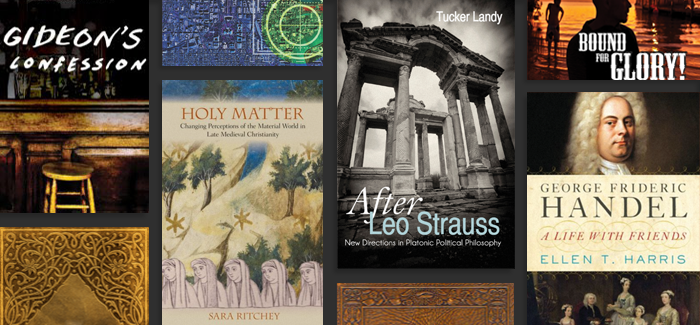
The Magazine lists a selection of general interest books, films, and albums by alumni. For additional alumni releases, browse the Magazine’s Goodreads bookshelf.
The Rise and Fall of Intelligence: An International Security History
Michael Warner, PhD’90 Author
As a historian for the US Department of Defense, Michael Warner has an inside perspective on state espionage. Also a former historian for the Central Intelligence Agency and the Office of the Director of National Intelligence, he details the evolution of information gathering from its emergence around 2000 BC through world wars, cold wars, and into the present day. Warner ends with a forward-looking analysis of intelligence in the Internet age, a new world where “privacy can be erased.”
Gideon’s Confession
Joseph G. Peterson, AB’88 Author
Every month, Gideon, the protagonist of Joseph G. Peterson’s fourth novel, receives a generous check from his wealthy uncle. The only catch: the uncle wants to know what Gideon plans to do with his life—besides smoking, drinking, and gambling. But Gideon is at a loss. “I’m an English major,” he says, “not an inventor. I don’t have an entrepreneurial bone in my body.” He drifts listlessly through the streets of Chicago until he meets rich, beautiful, ambitious Claire, and everything changes. Or does it?
Holy Matter: Changing Perceptions of the Material World in Late Medieval Christianity
Sara Ritchey, PhD’05 Author
Why trees? That question sparked Sara Ritchey’s study of medieval Christian expression, which exploded with representations of flora, fauna, and other features of the material world. She begins in the 12th century Rhineland, where communities of women believed the birth of Christ marked a re-creation of the world, his physical presence proving that matter itself could be holy. Ritchey traces the development of this doctrine and its profound impact on religious practice.
The Invisible Bridge: The Fall of Nixon and the Rise of Reagan
Rick Perlstein, AB’92 Author
Ronald Reagan rose to national political prominence in the wake of Watergate and Vietnam, preaching optimism and American exceptionalism to a chastened nation in his challenge to President Gerald Ford for the 1976 Republican nomination. Rick Perlstein, author of the bestselling Nixonland, explores how Reagan reversed a notion then gaining currency: that true patriotism meant a warts-and-all understanding of the United States and its place in the world. Four years later, his view in ascendance, Reagan won the presidency and created a vision of America rooted in “a cult of optimism and a blindness to its failings.”
Bound for Glory! New Settings of African-American Spirituals
Jonathan Miller, AB’85 Artistic Director
Chicago a cappella, an ensemble of professional singers founded in 1993 by Jonathan Miller, performs 17 spirituals, including four specially commissioned works and nine world premiere recordings. “If the spiritual teaches us anything, it is that we are not alone, even in our darkest moments and our times of deepest sorrow,” says Miller, the ensemble’s artistic director. Bound for Glory honors the legacy and power of spirituals in a modern medium.
George Frideric Handel: A Life with Friends
Ellen T. Harris, AM’70, PhD’76 Author
Unlike Handel’s famous operas and concertos, the details of his private life remain generally unknown. Ellen T. Harris explored the German-born Baroque composer’s letters, diaries, and personal files—and those of his closest friends—to dig up more than 400 pages of intriguing details, from his childhood and arrival in London to his relationships, finances, and philosophy. The result is a backstage pass into Handel’s life and inner circle, a narrative modeled after one of his favorite forms: the fugue.
After Leo Strauss: New Directions in Platonic Political Philosophy
Tucker Landy, AM’81, PhD’87 Author
Strauss’s work plays a significant role in modern students’ and thinkers’ understanding of philosophy, but Tucker Landy advises readers to resist the urge to interpret classic texts through a Straussian lens. In After Leo Strauss, Landy outlines his own reading of the Platonic dialogues, in which he reconciles classic and modern views of natural right and advances a Socratic theory of democratic liberalism.
